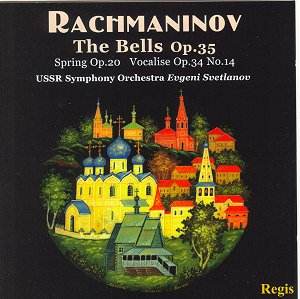The
music-making on this disc runs with that peculiarly Russian vein
of virile fantasy. This applies as much to the playing and singing
as it does to the recording techniques. With the exception of
the Vocalise none of these pieces are standard concert
fare.
Spring
sets words from Nekrasov's 'The Verdant Noise' in which
the cuckolded farmer stands ready to kill his unfaithful wife.
The onset of spring with its relentlessly benign power of renewal
saves the woman. Forgiveness reigns. The work was written in the
wake of the success of the Second Piano Concerto. Rachmaninov
had his friend Chaliapin in mind for the solo part but the premiere
was taken by Aleksay Smirnoff. Chaliapin sang the piece in St
Petersburg and Paris in 1905 and 1906. The work's auburn radiance
and warm melodic glow places it close to the Second Symphony.
It is a rare piece last heard by me many years ago on an RCA LP
(LSB4081) in a version with John Shaw and the New Philharmonia
conducted by Igor Buketoff who knew the composer. It was Buketoff
who orchestrated the first act (all that exists) of Rachmaninov's
Monna Vanna opera and he recorded that ‘stub’ with the
original version of the Fourth Piano Concerto on Chandos CHAN
8987. Spring is subtly and powerfully recorded - the only
digital item here. Yakovenko, as the betrayed farmer, is again
the baritone soloist. His voice had in the five years since his
role in The Bells gained a slight 'beat' but nothing destructive.
Spring demands large forces and blazing singing which it
gets in spades here (tr. 5. 13.10, 16.39) with the odd recollection
of Polovtsi savagery amid the plenteous elysian beauties (tr.5
13.41).
It
is refreshing to note that the three items are all concerned with
the human voice. Curiously the Vocalise has been
orchestrated by Valentin Klin to omit the soprano role and instead
subsume it into the orchestral fabric. It does not sound as plush
as it deserves in this thirty year old recording. Certainly Svetlanov
allows it to spread and breathe deeply.
The
main interest here is bound to focus on The Bells which
is vivid in the extreme with rhythmic interest gloriously and
cleanly etched (try tr.4 8.16). Another element is the singing
Russian soul which is intoxicatingly evident in the excitingly
beautiful sleighbells (recalled in the first of the Symphonic
Dances) and love-making of the first movement. These are the
silver bells of Poe's poem as translated by Balmont. And Alexei
Maslennikov is in meatily resonant voice, not a waver, not a tremble;
just sanguine Slavonic passion comparable with the effect stunningly
achieved by the bass Alexander Vedernikov in the Relief Recording
of Sviridov's Oratorio Pathétique. The golden bells
swing and ring unrushed. Although Pisarenko is shrill (in the
manner of many Slavonic sopranos) she is penetratingly vivid through
the dreamy Rimskian textures. Sadko and Golden Cockerel
echoes abound at this point - no doubt attributable to the
composer's spell as director of the Bolshoi. The tolling motif
recalls the Bell scene from Boris Godunov. The brazen fire
tocsin of the third movement conjures the rapine and destruction
that was to hammer and blast the Russian people for decades to
come. The finale is a lento lugubre which has another of
those rocking motifs - half tolling, half wave lapping similar
to The Isle of the Dead. Like so much of this work and
this performance the effect is one of extreme beauty and the cor
anglais solo at the start looks sideways towards Sibelius's Swan.
The layout of this work is intriguing with two movements (II and
IV) at lento and two at speed (I and III).
The
words of Spring and The Bells are not given ...
which is a pity. Contrast this with the regal treatment of the
listener in Regis's Barber collection drawn from Unicorn LPs where
full texts are given.
This
is a compellingly attractive purchase. There is nothing studious
or half-baked about the playing. The Bells bids fair to
be a top choice in a not very crowded market. Spring is
not otherwise available. It is at bargain price. It is well-filled.
Rachmaninovians will snap this up for the rare Spring.
Svetlanov's growing clan of admirers will want the disc for The
Bells. The music-making on this disc runs with that peculiarly
Russian vein of virile fantasy.
Rob
Barnett
